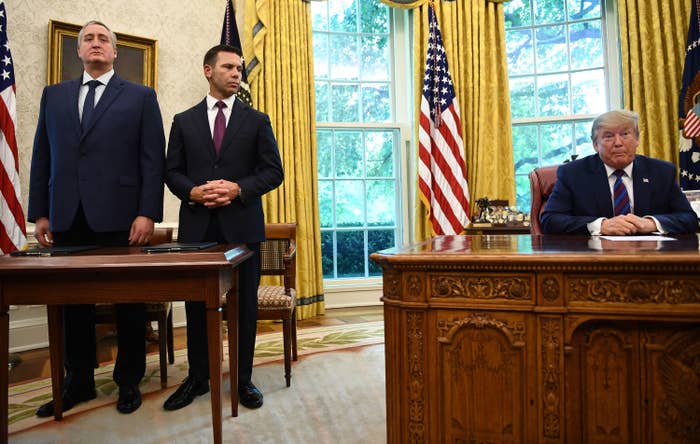
The Trump administration has circulated a proposal detailing possible procedures for carrying out future “safe-third country agreements,” according to a draft interim final rule obtained by BuzzFeed News. It was previously unclear how the agreements could potentially work.
The rule, if it is adopted by the Trump administration, would empower immigration officials to deport people seeking asylum at the US southern border — after an interview — to countries that have cut one of the agreements.
Acting DHS Secretary Kevin McAleenan has signed agreements with Central American countries that could force asylum-seekers to seek protections there instead of the US. He signed the latest agreement on Wednesday with Honduras, not long after signing two with Guatemala and El Salvador. McAleenan has so far stopped short of calling these agreements “safe third country” while the details are being worked out, though they certainly contain the features of such agreements.
But even though the agreements have been signed with those three countries, they have yet to be implemented as those countries face additional internal hurdles. Honduras, El Salvador, and Guatemala are some of the very places that immigrants are fleeing and have fueled the influx of people arriving at the US border for protection. The countries face rampant crime and murder rates and persecution of vulnerable communities.
It’s unclear whether the Trump administration will move forward with the rule. A DHS official said that the agency was reviewing whether one was necessary for its agreement with Honduras. (There is already one active safe-third country agreement in place with Canada, signed in 2002.)
Under the draft interim final rule, asylum officers would screen asylum-seekers to determine if they must obtain protections in a third country — one that is not the US or the country the person came from.
If people claim they fear for their lives in that third country, then the officers would screen whether it is “more likely than not” that they would be persecuted or tortured in that country.
If so, the individual would be allowed to try to obtain protections in the US. If denied, the rule would lead to them being deported to that country and told to apply for protections there.
“They are establishing blanket regulations so that they can quickly implement any safe third country agreement they sign moving forward,” said Sarah Pierce, an analyst at the Migration Policy Institute. “It’s further evidence they are trying to move as quickly as possible.”
McAleenan has said partnering with countries in Central America ultimately benefits the US by cutting down on the number of asylum-seekers attempting to make the journey to the US. Advocates have said that such agreements place vulnerable populations in countries that lack systems for adequate asylum processing and have high murder rates and rampant crime.
The draft interim final rule would take effect immediately and skip over a public comment process in an attempt to facilitate ongoing negotiations with countries like Mexico, Honduras, El Salvador, and Guatemala, according to language in the document.
To obtain “safe third country” status, the US must determine that a country has the appropriate and adequate structures in place to protect asylum-seekers.
In Guatemala and El Salvador, the structures appear to still be lacking. Administration officials told congressional staffers earlier this month that more than 200 individuals had applied for asylum in Guatemala but only 18 had been processed. In El Salvador only 18 people have sought protections there in the last seven years.
Politico first reported the draft rule on Friday.
The agreements and the existence of a draft interim final rule could be one way for the Trump administration to attempt to safeguard a potential court overturn of its policy banning asylum for those who cross through a third country.
While the Supreme Court allowed for the policy to continue while the case goes through a federal appeals court challenge, it’s unclear whether the justices or the federal appellate court will ultimately side with the Trump administration.
A senior DHS official told reporters on Wednesday that the agreements with Honduras, El Salvador, and Guatemala — which could lead to asylum-seekers being sent back to third countries — are another strategy toward stemming migration flows to the southern border.
“This is an additional tool,” the official said.
